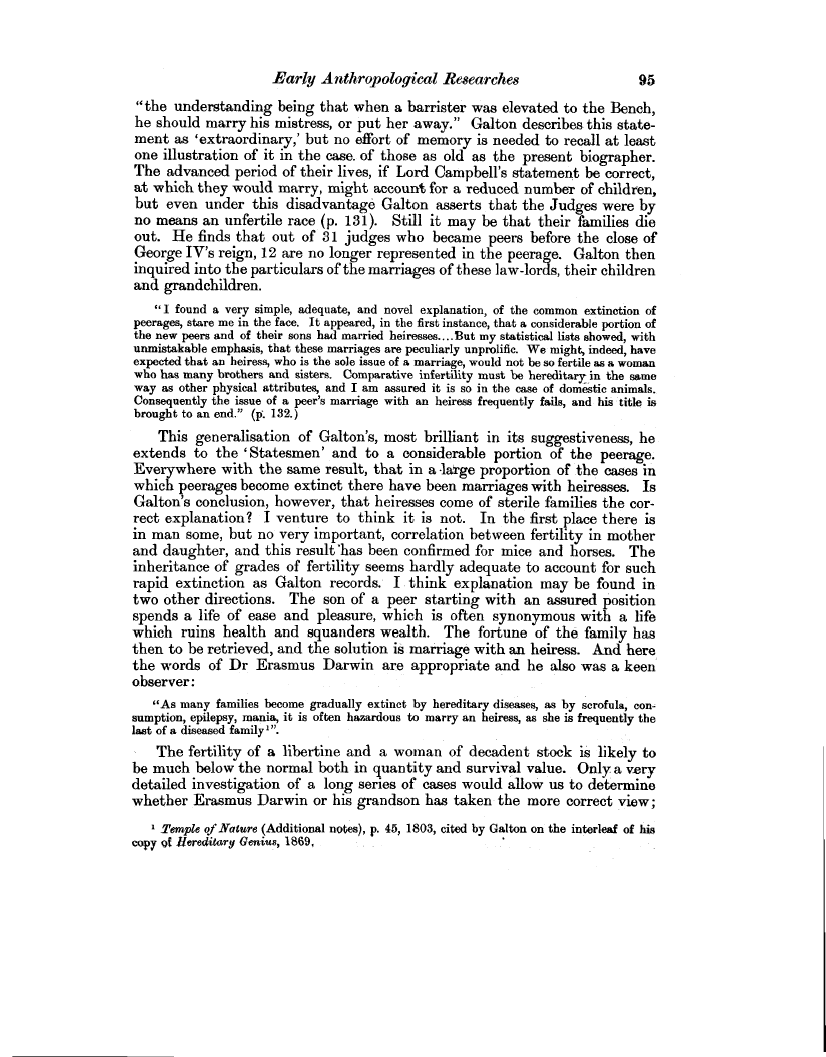Early Anthropological Researches 95
"the understanding being that when a barrister was elevated to the Bench, he should marry his mistress, or put her away." Galton describes this statement as `extraordinary,' but no effort of memory is needed to recall at least one illustration of it in the case. of those as old as the present biographer. The advanced period of their lives, if Lord Campbell's statement be correct, at which they would marry, might account for a reduced number of children, but even under this disadvantage Galton asserts that the Judges were by no means an unfertile race (p. 131). Still it may be that their families die out. He finds that out of 31 judges who became peers before the close of George IV's reign, 12 are no longer represented in the peerage. Galton then inquired into the particulars of the marriages of these law-lords, their children and grandchildren.
" 1 found a very simple, adequate, and novel explanation, of the common extinction of peerages, stare me in the face. It appeared, in the first instance, that a considerable portion of the new peers and of their sons had married heiresses... .But my statistical lists showed, with
unmistakable emphasis, that these marriages are peculiarly unprolific. We might, indeed, have expected that an heiress, who is the sole issue of a marriage, would not be so fertile as a woman who has many brothers and sisters. Comparative infertility must be hereditary in the same way as other physical attributes, and I am assured it is so in the case of domestic animals. Consequently the issue of a peer's marriage with an heiress frequently fails, and his title is
brought to an end." (p. 132.)
This generalisation of Galton's, most brilliant in its suggestiveness, he extends to the `Statesmen' and to a considerable portion of the peerage. Everywhere with the same result, that in a large proportion of the cases in which peerages become extinct there have been marriages with heiresses. Is Galton's conclusion, however, that heiresses come of sterile families the correct explanation? I venture to think it is not. In the first place there is in man some, but no very important, correlation between fertility in mother and daughter, and this result' has been confirmed for mice and horses. The inheritance of grades of fertility seems hardly adequate to account for such rapid extinction as Galton records. I . think explanation may be found in two other directions. The son of a peer starting with an assured position spends a life of ease and pleasure, which is often synonymous with a life which ruins health and squanders wealth. The fortune of the family has then to be retrieved, and the solution is marriage with an heiress. And here the words of Dr Erasmus Darwin are appropriate and he also -was a keen observer
"As many families become gradually extinct by hereditary diseases, as by scrofula, consumption, epilepsy, mania, it is often hazardous to marry an heiress, as she is frequently the last of a diseased family' ".
The fertility of a libertine and a woman of decadent stock is likely to be much below the normal both in quantity and survival value. Only a very detailed investigation of a long series of cases would allow us to determine whether Erasmus Darwin or his grandson has taken the more correct view;
I Temple of Nature (Additional notes), p. 45, 1803, cited by Galton on the interleaf of his copy of Hereditary Genius, 1869,

